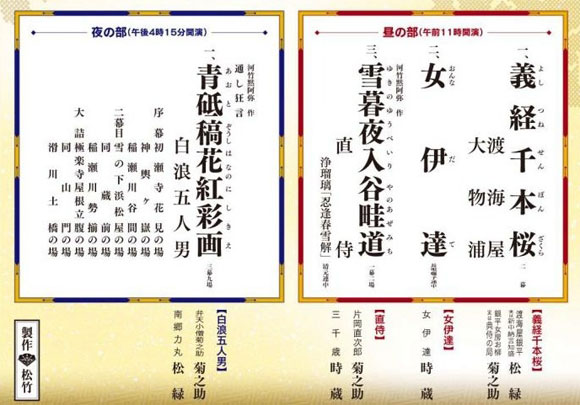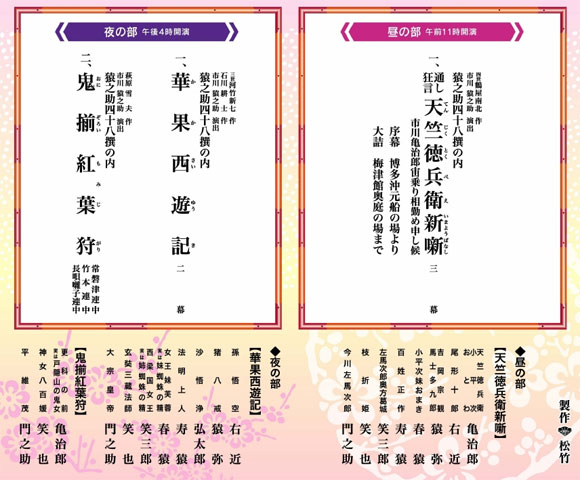| Comments |
Tokaiya/Daimotsu no Ura: these are two scenes from one of the greatest classics of
the puppet theatre, which has also become a classic of Kabuki.
After the wars between the Genji and Heike clans,
the Genji are victorious and their leader Yoritomo is now Sh˘gun. But there is a falling out
between Yoritomo and his brother Yoshitsune, the brilliant general responsible for the victory.
Now Yoshitsune is fleeing through the country and this play fancifully has him encounter
several famous warriors from the Heike clan, who are not dead, as history has it. Yoshitsune (Nakamura Baishi) books passage on a boat to Kyűshű, but the captain is actually
Taira no Tomomori (Onoe Sh˘roku), a general of the Heike clan that Yoshitsune helped to defeat.
Tomomori was supposedly killed by Yoshitsune in the final battle of the war, but in this play,
Tomomori is shown as surviving, living in disguise with the child emperor Antoku and his
nursemaid (Onoe Kikunosuke). At one moment the captain is a gallant commoner, but in the next,
he is Tomomori, a high ranking general close to the emperor. His wife as well is a
cheerful commoner who shows her true identity as a high-ranking lady-in-waiting in the
magnificent robes of the imperial court. Tomomori uses the opportunity to try to get his
revenge on Yoshitsune but is defeated again. Finally Tomomori holds a giant anchor and plunges
into the sea.
Onna Date: Nakamura Tokiz˘ stars as a woman in the pleasure quarters who swaggers and fights
in the finest gallant style but who has a delicate sense of femininity as well.
Naozamurai: the thief Naozamurai has been betrayed and is on the
run. He risks one last meeting with his lover, the courtesan Michitose,
but he has never revealed his true identity to her and as far as she knows,
he is a wealthy merchant. On a freezing, snow-bound night, in a romantic scene
accompanied by the lush and erotic singing of Kiyomoto narrative music,
the two lovers Naozamurai and Michitose meet and part forever.
Starring Onoe Kikunosuke as Naozamurai and Nakamura Tokiz˘ as Michitose.
Aoto Z˘shi Hana no Nishikie:
(A Brocade Print of the Age of Magistrate Aoto)
Written by Kawatake Mokuami in 1862, this play focuses on the thief Benten Koz˘ and was
inspired by a woodblock print of a sexy young man with tattoos covering his body with a
woman's hairstyle and kimono. Benten Koz˘ is a swindler and thief who makes use of his beauty,
both as a handsome young man and disguised as a beautiful woman. The sections about Benten Koz˘
are played frequently, but this marks a rare full-length performance that shows the stories of
all five thieves in the gang who are tied together by bonds of fate and obligation.
In the opening at a magnificent temple surrounded by cherry blossoms, Benten Koz˘
poses as a samurai youth and seduces a princess setting off events that will eventually destroy
Benten and all around him. A beautiful young woman comes to a clothing store with her servant,
but is discovered shoplifting and beaten. When she proves that she was not stealing,
her servant demands compensation. However, a samurai who happens to be in the store reveals
that the young woman is actually a man, and he proudly announces his name as Benten, the thief.
The servant is his fellow gang member Nang˘ Rikimaru and the samurai is actually
the head of the gang Nippon Daemon. However, they learn that the man they have defrauded
is actually Benten Koz˘ĺs father and the five thieves realize they cannot escape and
decide to wear magnificent matching kimonos as they meet their fate.
The act ends with a kind of spectacle showing the five members of the gang in their finest
kimonos under the cherry blossoms in full bloom. In elaborate speeches, they each
announce their name in the poetic diction for which the playwright Mokuami is famous.
Finally Benten Koz˘ fights off his pursuers in a spectacular fight on the roof of a temple.
Starring Onoe Kikunosuke as Benten Koz˘, Ichikawa Danz˘ as Nippon Daemon, Onoe Sh˘roku as Nang˘ Rikimaru,
Nakamura Baishi as Akaboshi Jűzabur˘ and Band˘ Kamesabur˘ as Tadanobu Rihei.
Also featuring Band˘ Kametoshi and Onoe Ukon as the magistrate Aoto Saemon Fujitsuna and Princess Senju.
Source: Earphone Guide website
|



